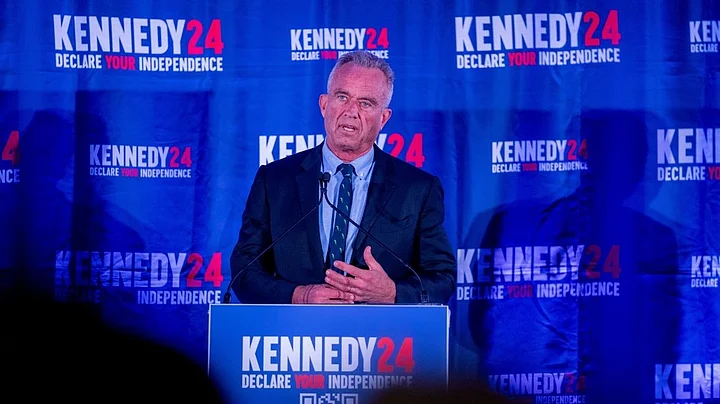George Washington, the first president of the United States, though a supporter of the Federalist Party, ran and won the office as an independent. Since then, the field of third-party candidates has been littered with the failed attempts of a host of others. Despite that unenviable record, various individuals continue to mount, what are mostly quixotic efforts. to win the presidency. This year’s election is no exception.
They include Jill Stein, a doctor and activist, who is running on the Green Party ticket, Chase Oliver, a left-leaning Libertarian Party candidate who has never held an elected political office, Cornel West, a philosopher and social activist, who is running as an independent and finally, Robert F Kennedy Jr, the son of the assassinated Senator Robert F Kennedy, who is also running as an independent.
Given the abysmal track record of all third-party candidates, why does anyone still throw their hats into the presidential race ring? The reasons are as manifold as the candidates themselves. For some, it is little more than sheer vanity and a chance at publicity. For others, it is a protest movement and little else.
And finally, some genuinely believe that they can miraculously beat the odds. Lacking the vast organisational and financial backing of the two dominant political parties their prospects of actually winning are nebulous.
Apart from his obvious political lineage, what, if any qualifications, does Kennedy have to run for the highest elective office in the United States? He started his career as an environmental lawyer, and was instrumental, at one stage of his career, in cleaning up the Hudson River in New York State from a host of industrial pollutants while working for two nonprofit, environmental organisations — Riverkeeper and the Natural Resources Defence Council (NRDC).
This was, no doubt, a significant achievement given the powerful corporate and industrial interests that were arrayed against him. Subsequently, he founded the Environmental Litigation Clinic at Pace University’s School of Law in New York City. He worked as its director while teaching environmental law at the university until 2017.
Apart from his environmental activism at home, earlier, Kennedy had also played a significant role as an activist abroad seeking to protect the rights of indigenous communities ranging from Central America to Canada. In every case, his involvement focused on large corporations which were seeking to extract natural resources, including petroleum, from their lands.
Beyond demonstrating that he was a deft litigator unafraid of taking on important corporations he had evinced no prior interest in running for any elective office let alone for the presidency. Despite his remarkable achievements in ending environmental degradation his views on a number of key public policy issues are bizarre. He has, for example, been obsessed with promoting a supposed link between vaccines and the onset of autism.
Medical professionals have repeatedly debunked this belief and have argued that there is no evident causal link. However, thanks to Kennedy and any number of other public figures, this assertion persists and has gained ground amongst significant segments of the American public. Worse still, on the campaign trail. Kennedy has continued to beat the drum on this matter.
He has even gone to the extent of attacking Dr Anthony Fauci, a noted virologist, who until recently was the Director of the National Institute of Allergy and Infectious Diseases. His ire was directed at Fauci in particular as the medical scientist had been a staunch advocate of the COVID-19 vaccine. Among other matters, in a book, The Real Anthony Fauci, he has also accused Fauci of abusing his power for decades ranging from the time of the onset of the AIDS epidemic to that of the COVID-19 outbreak.
Sadly, not content with promoting this baseless claim, he is also given to promoting other conspiracy theories. One of the most distressing of these has to do with his own extended family. It is well-known, that his uncle, John F Kennedy, was assassinated during a trip to Dallas, Texas. The Warren Commission Report, which investigated the assassination, was not without flaws.
However, most independent researchers have concluded that there was a sole gunman involved and that it was Lee Harvey Oswald. Indeed, the best book on the subject, the work of an American investigative journalist, Gerald Posner, Case Closed, had effectively set aside any number of outlandish conspiracy theories about the assassination. However, Kennedy has repeatedly resurrected a widely shared belief, amongst those given to conspiracy-mongering, that the Central Intelligence Agency (CIA) was responsible for the assassination.
Decades ago, a noted American historian, Richard Hofstadter, published an essay in Harper’s Magazine, entitled The Paranoid Style in American Politics in which he had identified a strain in American political culture that was prone to accepting and promoting conspiracy theories. His essay was extraordinarily insightful and prescient at the time he published it. Even today, sixty years later, it remains as relevant as ever and explains much about a certain enduring, if distressing, feature of the American political landscape.
(Sumit Ganguly holds the Tagore Chair in Indian Cultures and Civilizations at Indiana University, Bloomington and is a Visiting Fellow at the Hoover Institution at Stanford University. This is an opinion piece and the views expressed are the author’s own. The Quint neither endorses nor is responsible for them.)
(At The Quint, we question everything. Play an active role in shaping our journalism by becoming a member today.)
